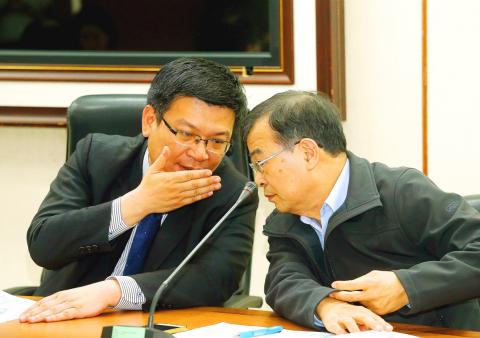The Ministry of Economic Affairs yesterday said it would freeze electricity prices for another six months, as it expects falling crude and coal prices to help reduce power generation costs.
The ministry said it sees only a slim chance of power prices increasing in the second half of this year, as a wobbling global economy might reduce fuel consumption and keep prices in check.
“The electricity review committee concluded its [twice-yearly] meeting by keeping electricity rates unchanged, as fuel prices are to trend down in the longer term,” Deputy Minister of Economic Affairs Tseng Wen-sheng (曾文生) told a media briefing in Taipei.

Photo: CNA
“Fuel costs play a major role in the electricity price adjustment mechanism,” Tseng said.
State-run Taiwan Power Co (Taipower, 台電) said fuel costs account for 55 percent of overall power generation costs, as about 80 percent of the nation’s electricity is produced at thermal power stations that burn coal, natural gas or crude oil.
Crude oil prices are expected to crawl back to about US$61 per barrel this year, compared with a peak of US$75 per barrel in September last year, the ministry said, citing a forecast by the US Energy Information Administration.
Global coal prices are expected to fall to about US$77 per tonne, from about US$108 per tonne in September last year, the ministry said, citing a projection by Macquarie Bank Ltd.
Looking forward, “there should be no price hike pressures, given a downturn in global fuel prices and the global economy,” Tseng said.
The prices “would be subject to Taipower’s financial performance,” he added.
The committee rejected Taipower’s proposal to raise electricity rates by 6.48 percent, capping rates at NT$2.6253 per kilowatt-hour until September.
The ministry denied speculation that it halted price hikes out of political considerations.
The committee was widely expected to increase electricity prices by 3 percent, the maximum adjustment set by the government, to help Taipower mitigate losses.
The ministry froze price hikes in the previous review in September last year in a bid to help tame inflation, despite a spike in fuel prices at the time and going against a pricing mechanism created in 2017.
The committee yesterday preliminarily approved the allocation of NT$36.4 billion (US$1.18 billion) from the energy price stabilization fund to offset Taipower’s losses.
After deducting the subsidy, the fund would shrink to NT$41.6 billion.
The state utility lost NT$14 billion last year, ending four straight years of profits. It lost NT$10.2 billion in the first two months of this year.
The ministry also said that May would not be included in the summer electricity period, during which Taipower increases electricity prices to encourage energy conservation.
May is not among the top five months with regard to energy consumption, it said.

Nvidia Corp chief executive officer Jensen Huang (黃仁勳) on Monday introduced the company’s latest supercomputer platform, featuring six new chips made by Taiwan Semiconductor Manufacturing Co (TSMC, 台積電), saying that it is now “in full production.” “If Vera Rubin is going to be in time for this year, it must be in production by now, and so, today I can tell you that Vera Rubin is in full production,” Huang said during his keynote speech at CES in Las Vegas. The rollout of six concurrent chips for Vera Rubin — the company’s next-generation artificial intelligence (AI) computing platform — marks a strategic

REVENUE PERFORMANCE: Cloud and network products, and electronic components saw strong increases, while smart consumer electronics and computing products fell Hon Hai Precision Industry Co (鴻海精密) yesterday posted 26.51 percent quarterly growth in revenue for last quarter to NT$2.6 trillion (US$82.44 billion), the strongest on record for the period and above expectations, but the company forecast a slight revenue dip this quarter due to seasonal factors. On an annual basis, revenue last quarter grew 22.07 percent, the company said. Analysts on average estimated about NT$2.4 trillion increase. Hon Hai, which assembles servers for Nvidia Corp and iPhones for Apple Inc, is expanding its capacity in the US, adding artificial intelligence (AI) server production in Wisconsin and Texas, where it operates established campuses. This

US President Donald Trump on Friday blocked US photonics firm HieFo Corp’s US$3 million acquisition of assets in New Jersey-based aerospace and defense specialist Emcore Corp, citing national security and China-related concerns. In an order released by the White House, Trump said HieFo was “controlled by a citizen of the People’s Republic of China” and that its 2024 acquisition of Emcore’s businesses led the US president to believe that it might “take action that threatens to impair the national security of the United States.” The order did not name the person or detail Trump’s concerns. “The Transaction is hereby prohibited,”

Garment maker Makalot Industrial Co (聚陽) yesterday reported lower-than-expected fourth-quarter revenue of NT$7.93 billion (US$251.44 million), down 9.48 percent from NT$8.76 billion a year earlier. On a quarterly basis, revenue fell 10.83 percent from NT$8.89 billion, company data showed. The figure was also lower than market expectations of NT$8.05 billion, according to data compiled by Yuanta Securities Investment and Consulting Co (元大投顧), which had projected NT$8.22 billion. Makalot’s revenue this quarter would likely increase by a mid-teens percentage as the industry is entering its high season, Yuanta said. Overall, Makalot’s revenue last year totaled NT$34.43 billion, down 3.08 percent from its record NT$35.52